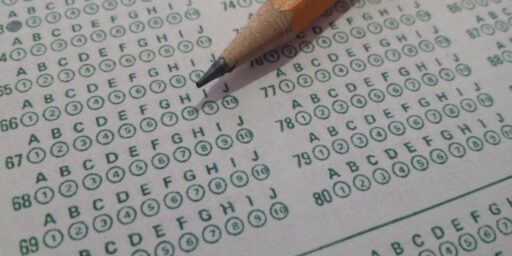Extracurriculars
 A while back, Bryan Caplan observed,
A while back, Bryan Caplan observed,
Colleges care about applicants’ extracurricular activities. Employers don’t. What’s going on? I’m tempted to just repeat my adage that, “Non-profits are crazy,” but even non-profit employers don’t seem very concerned about how you spend your spare time.
He asked for theories and Tyler Cowen offers one:
Colleges want to expand the heterogeneity of the selection criteria so they can pick who they want. If it’s a top college or university, mostly this means limiting the number of Asians and maximizing the number of future donors and by the way those two goals tend to move in tandem. Other than legacy admissions, I wonder what other features of applications predict future donations? Might extra-curricular activities be one candidate here?
The problem, however, is that the question is based on a false premise. As Jim Manzi observes,
I started a software company that hires many university graduates. We care about extracurricular activities. I was a hiring partner at a large management consulting firm. We cared about extracurricular activities. My first job out of school was at AT&T Laboratories. They asked me about extracurricular activities at many points in the interviewing process
But have the companies where I worked been bizarre outliers? CareerBuilder does an annual survey of several thousand hiring managers and HR professionals who say that prior experience is “one of the most important factors they look for in applications from recent college graduates.”
My guess is that Caplan and Cowen are confused by two related facts: universities don’t typically look at extracurriculars of the undergraduate type when hiring faculty members and employers, generally, tend not to care much about that sort of thing for more advanced positions. By that stage of one’s career, people are hiring based on one’s professional achievements and competencies, including networking skills.
But when dealing with very young people — whether it’s a college admissions office or an employer hiring young folks right out of college — extracurriculars are a logical way of separating the wheat from the chaff. All the candidates had excellent grades because, face it, who doesn’t these days? So, membership and leadership in clubs and activities are at least some indicator of an ability to play well with others and balance the competing priorities for one’s time.
As someone who reviews résumés of kids finishing up college from time-to-time, I must say that I pay some attention to extracurriculars. One of my pet peeves, however, is applicants who list partisan political activity on the CV. Unless you’re applying for a partisan political job, that’s just a sign of good judgment.






Plus, there is an issue of how these things are weighed. Yes, colleges want applicants to list extracurricular activities on applications, but the most significant determinants for acceptance are standardized test scores and GPA (in that order). I think Caplan’s observation over-estimates the degree to which extra-curricular activities matter for getting into school.
Greetings:
And the science that supports your conclusion might be found where? Perhaps it’s just “extracurriculars” seeking other “extracurriculars”? You know, joiners and networkers and such. Come to the “Borg”.
When I think back on my extracurricular experiences, I recall a lot of time wasted with some pretty immature people accomplishing little of value past kicking the can a bit farther down the road. Extracurriculars may be worth a cursory examination, but to me they seems more like opening an opportunity for some largely unverifiable puffery. You know, like in giving good interview which, these days, we seem to have in overabundance.
I pretty much look at hiring as no better than a 50-50 situation, kind of like dating. Apply your intelligence and experience to the selection process, but be prepared to use the first 3-6 months of employment as your real determinative. “If you want to know me,” my grandfather used to say, “come and work with me.”
The companies I worked for didn’t think I should have time for “extracurriculars”, they seemed more interested in “conflict of interest issues” and being sure my skills were always on call![lol]
@11B40: Well, I’d say it depends on what you did with your extracurriculars, not so much whether you had them.
When I left teaching and we were interviewing for my replacement, many of the applicants were not more than a year out of college, so I certainly did look at extracurriculars. Not as the first thing, no, but I needed some evidence that we were interviewing people with charisma, organization, leadership, etc. — all things we needed in a prospective teacher, and all things that extracurriculars can indicate better than classes (not so well as interviews and sample lessons, but hey, you don’t want to bring every candidate to campus).
But I looked at extracurriculars the same way I’d look at job experience — what are the bullet points? “Member of classics honor society” is, as you note, valueless. But “organized an undergraduate research symposium on behalf of classics honor society”? Now that is interesting.
I think with college and possibly employment out of college extracurriculars act more as the tie break when two applicants meet most other criteria equally.
I do suspect they have more meaning for college applicants than anywhere else, and honestly they can be a good indicator of somebody who can succeed in college (at the very least active involvement in a variety of activity indicates the ability to manage time)-I am not so certain extracurriculars indicate a person graduating from college is going to be a good employee.
Once a person is established in the work force, I don’t really think it indicates much at all unless the extracurricular provides some skill that is a bonus for the job.